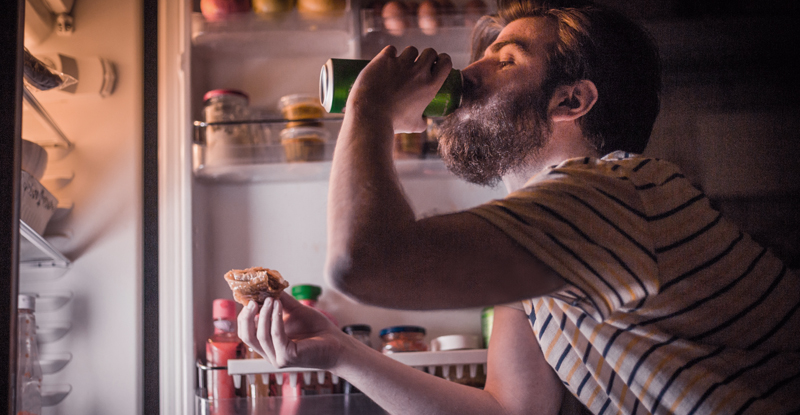The Truth About Late Night Eating

We’ve heard it all before: “Anything I eat at night will be stored as fat in my body”; “I can’t eat before bed — the food will just sit there”; “I’m on a diet, so I made a rule that I can’t eat past 6 p.m.” These ideas about weight loss have been floating around for years. While there can certainly be a correlation between late-night eating and weight gain, this blog will help you navigate to the truth of this matter.
Does When You Eat Matter?
The idea of eating light late at night to avoid gaining weight ignores the most important element of weight management: energy balance. Energy balance involves the number of calories you take in through food and the number of calories (energy) your body burns.
To lose weight, you need to have a calorie deficit. This usually involves setting a calorie budget based on your starting weight, then tracking what you eat to make sure you are staying within that budget. Doing moderate physical activity can help with your weight loss by expending calories and increasing your deficit. (You don’t just expend energy when you exercise — your body burns calories 24 hours a day just by functioning!)
So, as long as you monitor your calorie intake for each day and create a calorie deficit, it shouldn’t matter when you eat. People often run into trouble at night because they consume too many calories. Here’s a classic scenario: You’ve eaten three meals and snacks throughout the day, but you really want a bowl of ice cream at 8 p.m. while watching TV. That treat will likely push you over your caloric budget for the day. If you do this day after day, it can lead to weight gain.
When it comes to weight loss, it’s not about when you eat but how smart you eat. Track your calories, find realistic ways to cut back, and move more. Don’t restrict yourself with rules that eliminate certain foods or limit when you can eat. Make changes you feel you can maintain.
Tips for Cutting Back on Late Night Eating:
- Plan ahead. Don’t think you can give up that late night bowl of popcorn or those cookies and milk? Don’t panic — you just have to plan ahead and save room for that snack. You can enjoy a guilt-free snack late at night if you planned it into your calorie budget for the day.
- Portion control. Avoid taking an entire bag of potato chips with you to the couch. Portion out a serving (or two), then leave the bag in a cabinet. You’ll know exactly how many calories you are consuming and will avoid unintentionally overeating.
- Switch it up. Try to find lower-calorie alternatives to your favorite snack foods. Try low-fat popcorn instead of potato chips, a bowl of sherbet instead of ice cream, or fresh fruit and whipped cream instead of baked goods. The possibilities are endless — just read the labels and get creative!
- Know yourself and your schedule. Are you always eating dinner late because of your busy schedule? Do you often eat large portions — and have seconds — because you’re famished by the time you sit down to eat? Try having a snack in the afternoon or early evening — maybe even on your way home. This can help you make better choices at dinner and stay within your calorie budget.
- Be flexible. If you know there’s an event or reason you may eat more calories in the evening, find ways to cut back throughout your day without skipping meals. (Think of strategies you use to managing money and implement them here!) For example, you could have a 100-calorie yogurt and a piece of fruit for breakfast instead of a normal 400-calorie meal. The savings will add up!



